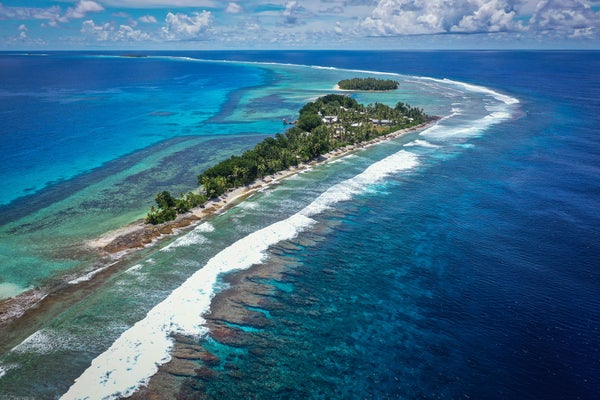Ocean Court Rules Countries Must Cut Climate Pollution
In its first climate change case, the International Tribunal for the Law of the Sea determined that a global ocean convention extends to greenhouse gases, meaning countries have an obligation to reduce them

Aerial view of the island nation of Tuvalu, one of the first countries likely to disappear due to climate change.
Brandi Mueller/Getty Images
CLIMATEWIRE | An international court governing the world’s oceans ruled Tuesday that countries must protect marine environments from climate change by cutting their planet-warming pollution.
The first-of-its-kind decision by the International Tribunal for the Law of the Sea in Hamburg, Germany, could have widespread implications on efforts to tackle global warming, including on future pledges countries make under the Paris Agreement, say legal experts. It could also be used to reduce carbon emissions from cargo ships and industrial facilities.
The 21-judge panel agreed unanimously that national obligations to protect oceans extend to greenhouse gases that are causing seawater temperatures to rise dramatically, and that countries must “take all necessary measures to prevent, reduce and control marine pollution” related to climate change.
On supporting science journalism
If you’re enjoying this article, consider supporting our award-winning journalism by subscribing. By purchasing a subscription you are helping to ensure the future of impactful stories about the discoveries and ideas shaping our world today.
The decision is not legally binding, but it could be used by courts in the 169 countries that are members of the United Nations Convention on the Law of the Sea, including major emitters such as China and the European Union. The United States is not a party to the convention.
“The power of this case has been its simplicity: Greenhouse gas emissions are pollution, and as such they trigger these exacting obligations,” said Payam Akhavan, lead counsel representing the small island nations that brought the case before the tribunal.
In addition to calling on countries to reduce their carbon pollution, the decision also extends to the restoration of degraded ocean habitats, potentially steering money toward adaptation projects.
The tribunal also said governments should support other countries that are especially vulnerable to the effects of climate change, and it noted that global pledges made under the Paris Agreement are not sufficient to meet countries’ obligations under the law of the sea.
“To those that would hide behind the weaknesses of international climate treaties, this opinion makes clear that compliance with the Paris Agreement alone is not enough,” Nikki Reisch, director of the climate and energy program at the Center for International Environmental Law, said in a statement. “Pledges and promises at annual climate conferences do not satisfy States’ legal duties to take all necessary measures to prevent, reduce, and control the greenhouse gas emissions polluting the marine environment.”
The decision from the tribunal is known as an advisory opinion that clarifies national obligations to protect oceans from climate change.
Some advocates say the ruling could push countries to submit stronger carbon-cutting plans after this year’s global climate talks in Azerbaijan, known as COP29.
“And because business must follow where governments lead, companies and financial institutions are going to feel a knock-on effect from this development, too — no matter where they operate,” said Lea Main-Klingst, a lawyer with ClientEarth, a legal nonprofit.
The island nations brought the case to the tribunal over frustration with the pace of climate action, said Akhavan, the lawyer for the small island states. Global temperatures are set to rise between 2.5 and 2.9 degrees Celsius based on current policies, according to the United Nations.
“Now the conversation has to change,” Akhavan said during a press conference following the decision. “At the very least, one would hope that from COP29 onwards, states will revisit the assumptions that they’ve had about whether their conduct is sufficient to meet their international obligations.”
How countries will apply the decision remains to be seen. But it could sway other high-profile courts that are weighing similar questions about whether countries are violating international law by polluting the climate.
Some of the island nations that brought the case before the tribunal called Tuesday’s ruling a step forward for climate justice.
“We hope that the international community will seriously utilize the decision … that has been delivered today to inform its work in this area and to ensure that small island states like Tuvalu stand a chance of surviving the existential threat we face on a daily basis,” said Eselealofa Apinelu, the attorney general of Tuvalu.
Reprinted from E&E News with permission from POLITICO, LLC. Copyright 2024. E&E News provides essential news for energy and environment professionals.

